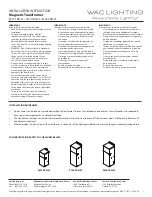
© Inovonics, 2011 - www.inovonics.com
EN1215EOL EchoStream
®
Universal
Transmitter with Wall Tamper
Installation Instructions - 05042E, March 24,
2011
1 Overview
The Inovonics EN1215EOL universal transmitter with an
included wall tamper switch can be used with any
standard contact or sensor. A 2.2K ohm end of line
resistor is included with the EN1215EOL, and is required
for operation.
The EN1215EOL includes a back tamper switch. The
tamper condition must be defined within the control panel
as a trouble condion when the system is disarmed, and
as an alarm condition when the system is armed.
Note:
For UL installations, refer to the
EN4216MR
Installation and Operation Manual
, the
EN4232MR
Installation and Operation Manual
, or the
EN7285
Installation Instructions
.
Note:
For UL installations, the switch contact must be in
the same room as the EN1215EOL.
Note:
The cable length from the switch contact must not
to exceed 10 feet.
Note:
For UL installations, the EN1215EOL must be
installed in accordance with UL 681.
1.1 Inovonics Wireless Contact Information
If you have any problems with this procedure, contact
Inovonics technical services:
• E-mail: [email protected]
• Phone: (800) 782-2709
1.2 EN1215EOL Components
Figure 1
EN1215EOL components
2 Installation and Startup
2.1 Installation Notes
• These products are designed to be installed and
maintained by professional security technicians.
• Products are intended for indoor use.
• Manually test all products weekly.
2.2 Install/Replace the Battery
1.
Insert a small screwdriver to depress the housing
release tab on the bottom of the transmitter; pry the
housing apart.
Figure 2
Open the EN1215EOL Housing
2.
If replacing a battery, remove the old battery.
3.
Install the new battery.
4.
Press the
Reset
button to initialize the transmitter.
5.
Test the transmitter and ensure appropriate response.
2.3 Select the Frequency Band
EchoStream products are able to use a range of radio
frequencies, and must be configured for your geographic
area. To configure the transmitter:
1.
Place a selection jumper on the appropriate frequency
band selection pins.
• Place the jumper on the right two pins, marked NZ, to
set the frequency range to 921-928 MHz for New
Zealand.
• Place the jumper on the left two pins, marked AU, to
set the frequency range to 915-928 MHz for
Australia.
• Leave the jumper off the pins to set the frequency
range to 902-928 MHz for North America.
Note:
Only devices set for use in North America are
configured for UL or cUL installations.
2.
Press the
Reset
button to complete configuration.
Caution:
When pressing the
Reset
button, make sure
you don’t also touch the frequency band selection pins.
Touching the frequency band selection pins while
pressing the
Reset
button can inadvertently set the
EN1215EOL to the wrong frequency band.
2.4 Select Input Type and Wire Resistor
The N/O-N/C selection pins allow the choice of a normally
open or normally closed state for the contact circuit wired
to the input terminal.
The transmitter is shipped set for normally closed, with no
selection jumper on the N/O selections pins.
Set for Normally Open Operation
1.
Place a selection jumper on the selection pins to
select normally open.
2.
Use 22 AWG wire to wire the 2.2K ohm resistor in
parallel with the N/0 contact per Figure 3. The distance
from the external contact to the EN1215EOL must not
exceed 10 feet (3 meters).
3.
Press the
Reset
button to complete configuration.
Figure 3
Wired for N/O operation
Normally Closed Operation
1.
Remove the selection jumper from the selection pins.
2.
Use 22 AWG wire to wire the 2.2K ohm resistor in
series with the N/C contact per Figure 4. The distance
from the external contact to the EN1215EOL must not
exceed 10 feet (3 meters).
3.
Press the
Reset
button.
Figure 4
Wired for N/C operation
A
B
C
D
E
E
F
G
A
Housing tamper button
B
N/O - N/C jumper
C
Input terminal
D
Reset button
E
Wall-mount screw holes
F
Housing screw hole
G
Frequency band selection pins




















